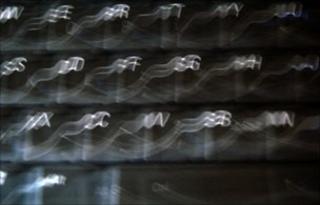French downloaders face government grilling
- 27 July 2011
- From the section Technology

The body responsible for administering France's "three strikes" anti-piracy law has summoned a group of web users to explain their file sharing habits.
Hadopi takes its name from the 2009 legislation which permits authorities to fine copyright infringers, or to cut off their internet connection.
The move is the most significant enforcement action since French politicians passed the law.
However, the 10 individuals named in the action are not obliged to appear.
France's "three strikes and out" legislation empowers Hadopi to identify suspected illegal file sharers and write to them, demanding they stop.
Those who do not comply after several letters can be disconnected from their internet service provider and blacklisted from obtaining services from another ISP.
In the UK, the Digital Economy Act makes some similar provisions, although the exact nature of possible sanctions has yet to be fully explained.
The blanket term "technical measures" is used to cover a range of potential consequences ranging from enforced slowdown of internet connections to disconnection.
Legal action
Hadopi said that in the last nine months it has been tracking 18 million French IP addresses.
It has sent a total of 470,000 first warnings by email, with 20,000 users receiving a second warning through the mail.
About 10 people who appeared to ignore the two warnings were asked to come and explain their actions to the agency.
After the meeting, Hadopi will decide whether to pursue legal action.
It will then be up to a judge to rule if a user has broken the law.
"The judge may impose a fine of a maximum of 1,500 euros (£1,326) and also disconnect the user from the internet for a maximum of one month," said a Hadopi spokesperson.
"Alternatively, he may decide to fine the user without the disconnection penalty - or simply let the user go."
But Jeremie Zimmermann from French citizen advocacy group La Quadrature du Net (Squaring the Net) thinks that it is unlikely that anyone will ever be charged.
"Hadopi is hoping that people will come and confess, that they will say that they have indeed downloaded copyrighted material," he told BBC News.
If the person does not confess or does not even show up, the only evidence the agency can present before the judge is a series of numbers - a particular computer's IP address, he said.
This poses several problems, believes Mr Zimmermann.
Firstly, hackers can easily break into a user's wireless hotspot and stream illegal content to a particular IP address using a different computer.
"We have no idea how this data has been acquired," said Jeremie Zimmermann. He expects that securing a conviction difficult, if not impossible.
Hadopi disagrees. "It's not only about the IP address," said its spokesperson.
"What we have to show is that the person has been warned that there's something wrong going on with his internet usage - that there's been illegal file-sharing - and that he has not done anything to protect himself from it after the first warning.
"So the evidence is the second warning received by the person."
Connection 'hacked'
The first person to respond to Hadopi's "invitation" has already declared his innocence.
Robert Tollot, a 54-year-old high school teacher from the region of Loire, will present himself to the Hadopi officials in Paris in September.
He told the French media that he had never downloaded any copyrighted material and that his wi-fi connection was hacked.
"He's absolutely furious, and it can turn out really badly for Hadopi as others will hear about his case and will prepare accordingly," said Mr Zimmermann.
"This law is absolutely useless," he added.
"For Hadopi it's now all about this strategy of intimidation - they're sending out warnings to make people believe that file-sharing is bad, but that's as much as they can do."
